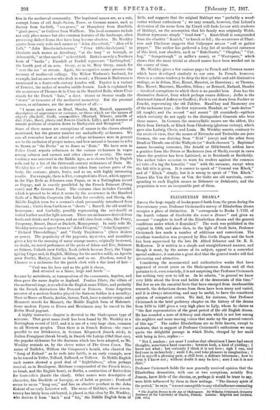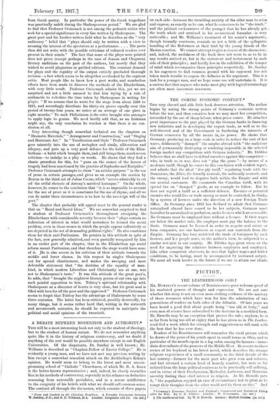ELIZABETHAN DRAMA.*
AMONG the large supply of books poured forth from the press during the Tercentenary year, Professor Creizenach's survey of Elizabethan drama occupies a place of distinction. It " corresponds to Books I.-VIII. of the fourth volume of Geschichte des neuenn Drama" and gives an account " complete in itself of the Elizabethan drama and the general conditions under which it flourished." The work was published in the original in 1909, and since then, in the light of fresh facts, Professor Creizenach has made a number of additions and corrections. The excellent translation was prepared by Miss Cecile Hugon and the book has been supervised by the late Dr. Alfred Schuster and Dr. R. B. McKerrow. It is written in a simple and straightforward manner, and though it must, by the nature of its subject, appeal to a somewhat special audience, it contains a great deal that the general reader will find interesting and attractive.
Considering the monumental and authoritative works that have appeared of recent years on the Shakespearean drama and all that pertains to it, even remotely, it is not surprising that Professor Creizenach has nothing very new to tell us. As he admits, " in general we know very little about the lives and habits of the dramatists of this time." But few as are the essential facts that have emerged from inexhaustible research, the deductions drawn from them have been many and varied, and it is always interesting, and may be useful, to have the considered opinion of competent critics. We find, for instance, that Professor Creizenach in the brief prefatory chapter on the history of the drama from 1570 to 1587 gives a very high place to Lyly, whom ho claims as " the first representative of the great period of the old English drama. He has sounded a note of dehieacy and charm which is not lost among the mightier and more moving voices that make up the general concert of this age." The earlier Elizabethans are so little known, except to students, that in support of Professor Creizenach's enthusiasm we may quote the delightful passago in which Niobe, charged by her maid with being in love, replies :—
" Not I, madam ; yet must I confess that oftentimes I have had sweet thoughts, sometimes hard conceits ; betwixt both, -a kind of yielding ; I know not what ; but certainly I think it is not love ; sigh I can, and find ease in melancholy ; smile I do, and take pleasure in imagination ; I feel in myself a pleasing pain, a chill heat, a delicate bitterness ; how to term it I know not ; without doubt it may be love ; sure I am it is not Hate."
Professor Creizenach holds the now generally received opinion that the Elizabethan dramatists, with one or two exceptions, notably Ben
Janson, know little of the cicadae, or, perhaps it would be truer to any. were little influenced by them in their writings. " The literary spirit of the period," he says, " was not susceptible to any vital influence emanating • The English Drama in the Age of Shakespeare. By Wilhelm Crelzenach (formerly Professor at the University of Cfacow, Poland). Loudon : SliprIck sad Jackson. (18s. net.) from Greek poetry. In particular the power of the Greek tragedians was practically unfelt during the Shakespearean period." We are glad to find that Professor Creizenach is not among the pedantic critics who seek for a special significance in every line written by Shakespeare. The great poet and his brother-writers held what he describes as the " very unliterary " belief that " plays should only be written with a view to arousing the interest of the spectators at a performance. . . . The poets then did not write with the possible criticisms of cultured readers ever present in their minds." The fact that some of the plays were printed does not prove (except perhaps in the case of Jenson and Chapman) literary ambitions on the part of the authors, but merely that they wished to avoid plagiarism or garbled editions. The constant demand for plays and the rapidity of the output entirely precluded thorough revision—a fact which seems to be altogether overlooked by the captious critic. Most people like to know how a poet works, and numberless efforts have been made to discover the methods of the Elizabethans, with very little result. Professor Creizenach admits this, yet we are surprised and not a little amused to find him trying by a rule of arithmetic to calculate the time taken by Shakespeare in writing his p7ays; " If we assume that he wrote for the stage from about 1588 to 1611, and accordingly distribute his thirty-six pieces equally over this period of twenty-four years, we arrive at an average of one piece in eight months." To such Philistinism is the critic brought who attempts to apply logic to genius. We need hardly add that, as an Irishman might say, the only conclusion he reaches is that there is no con- clusion at all.
Very interesting though somewhat technical are the chapters on " Dramatic Materials," " Arrangement and Construction," and "Staging and Histrionic Art." In " Versification and Style " Professor Creizenach goes minutely into the use of metaphor and simile, alliteration and allegory, and puts up a very good defence for the habit of the Eliza- bethans—a- habit which brought them, and still brings them, much severe criticism—to indulge in a play on words. He shows that they had a classic precedent for this, for " puns on the names of the heroes of tragedy had been sanctioned by the practice of Sophocles and Euripides." Professor Creizenach attempts to claim " an artistic purpose " in the use of prose in certain passages, and gives as an example the oration by Brutus in the third act of Julius Caesar, which "serves admirably to set off the artful rhetoric of Antony's metrical harangue." On the whole, however, he comes to the conclusion that "it is as impossible to account for the use of prose as it is sometimes for the use of rhyme, and all we can do under these circumstances is to bow to the sovereign will of the poet."
The chapter that probably will appeal most to the general reader is that on "Moral and Social Ideas." We are somewhat surprised to fin.d a student of Professor Creizenach's thoroughness arraigning the Elizabethans with considerable severity because their " plays contain no indication of interest in what would nowadays be termed the social problem, even in those scenes in which the people appear collectively or are depicted in the act of demanding political rights." He also condemns them for their anti-Puritanism. He persists in this attitude in spite of the fact, now generally admitted, and even partially recognized by him in an earlier part of the chapter, that in the Elizabethan ago social reform meant Puritanism, and that therefore the stage would have none of it. He is also severe in his criticism of their attitude towards the middle and lower classes. In this respect he singles Shakespeare out for special chastisement, and makes the sweeping and most debatable statement that " the doctrine of the equality of man- kind, in which modern Liberalism and Christianity are at one, was not to Shakespeare's taste." It was this attitude of the great poet's, he adds, that " brought the mightiest literary genius of our own age into such painful opposition to him. Tolstoy's spiritual relationship with Shakespeare as a discerner of hearts is very close, but his great soul is filled with love for all the poor and the oppressed." Professor Creizenach seems to forget that Tolstoy has the advantage of Shakespeare by some three centuries. The latter has been criticized, possibly deservedly, for many things, but it seems rather hard that, writing in the sixteenth and seventeenth centuries, he should be expected to anticipate the political and social opinions of the twentieth.



































 Previous page
Previous page